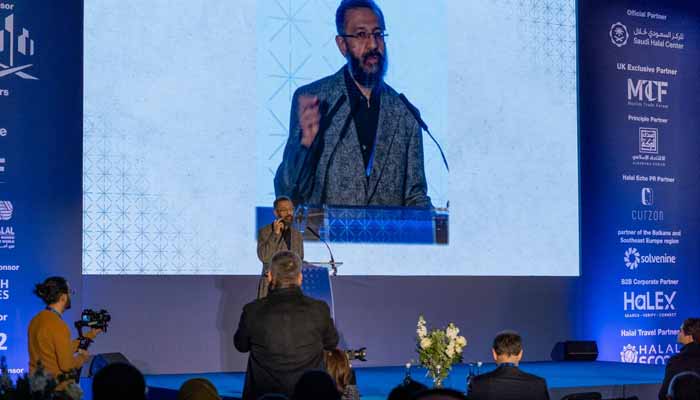LONDON: The global halal economy is now worth over $2.4 trillion per annum, and its expanding at a fast pace, speakers said at the London Halal Forum 2025 held at Excel London with participation from dozens of Islamic countries, including Pakistan.
The event brought together exhibiting businesses, investors, policymakers and media to contribute to the UK’s economic growth by facilitating trade with the expanding global Halal economy worth $2.4 trillion, as reported by Dinar Standard in their State of the Global Islamic Economy 2024/25 report.
The forum focused on cross-border cooperation and responsible growth. Two major strategic partnerships were announced: a new agreement between the Islamic Chamber of Commerce and Development (ICCD) and the Islamic Chamber of Commerce and Development (Kenya), aimed at strengthening certification pathways and market access across East Africa; and a strategic cooperation agreement, focused on enhancing data-driven investment strategies and innovation across halal sectors.
The delegates participated in the “Halal for Business Excellence” conference, which explored the commercial, governance and cultural dimensions of Halal markets. A leader’s talk on technology, trust and global integrity highlighted how halal standards remain central to consumer confidence worldwide.
Panel discussions through the day brought together industry, government and investment voices to examine Saudi Arabia’s strategic role in global Halal development; Bosnia and Herzegovina’s emergence as a European excellence hub; the importance of women’s leadership and cultural diplomacy in driving inclusive growth; the rise of Halal-preneurship and startup innovation; and the role of values-driven storytelling in shaping public understanding of Halal sectors.
Mr Yousef H Khalawi, Secretary General of the Islamic Chamber of Commerce and Development, said: “The conversations and collaborations we saw today reaffirm the essence of Halal as a universal value of purity, trust and excellence. As the Halal economy continues to grow, our responsibility is to ensure that its foundations remain rooted in integrity and accountability. The initiatives launched on Day One reflect a global community working together not only to expand trade, but to uplift standards and build a future defined by ethical growth.”

Day two of the forum featured the Palestinian Breakfast, an invite-only cultural and networking experience, followed by a series of Masterclasses on innovation, sustainability, digital Halal platforms and investment strategy.
In the afternoon, delegates attended the Halal Echo Afternoon Tea, a roundtable bringing together journalists, PR practitioners, content creators and media professionals from across the UK and the wider OIC diaspora.
Pakistan was represented by Aalia Jafar, Director of International Relations at the Islamic Chamber of Commerce and Development (ICCD), where she introduced Menara Global — a new ICCD initiative designed to bring together media, PR, and communications professionals from across OIC countries to support authentic storytelling, strengthen professional networks, and create a more unified and confident global narrative for our communities.
George Fulton, who rose to fame through GEO’s ‘George Ka Pakistan’, said: “There is a huge misconception that Halal economy is only about the meat. It’s not. It’s actually about creating a whole ecosystem of products and services that align with Muslim consumers’ ethical, spiritual and lifestyle needs – from finance and fashion to travel, technology and healthcare. When we understand that, we see that the Halal economy is not a niche; it is a framework for more transparent, responsible and inclusive growth that benefits everyone, not just Muslims.”


